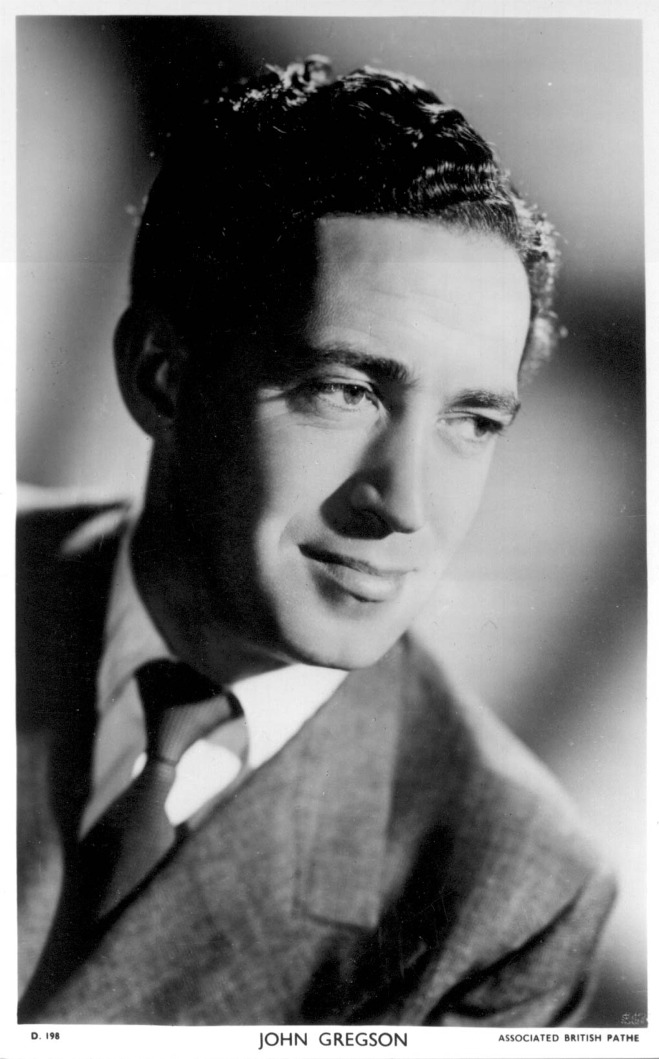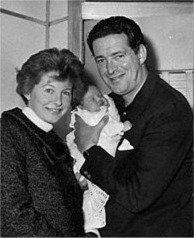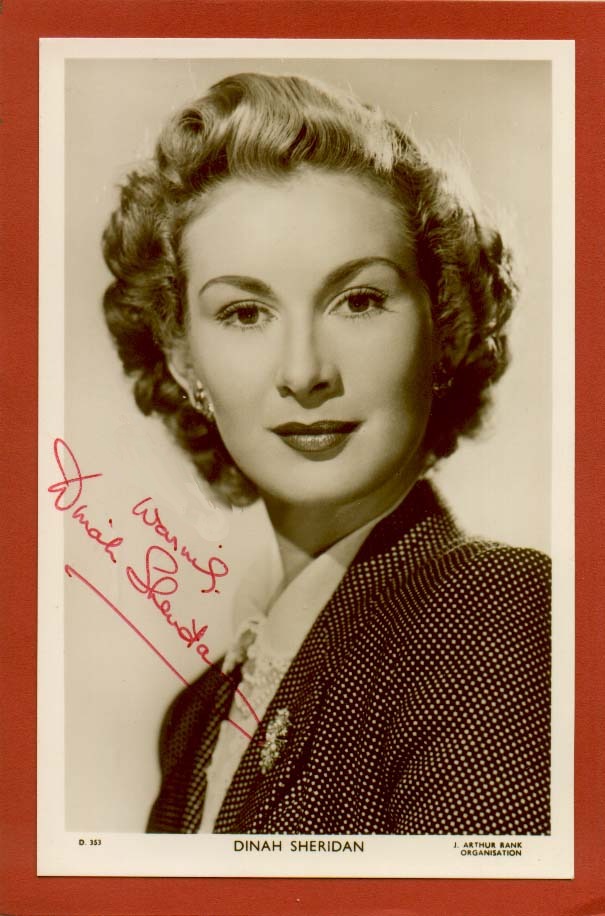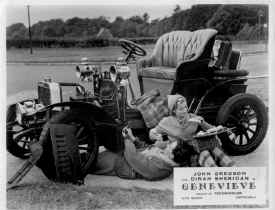
Cast
biographies from the original 1953 "Genevieve" U.S. Press release:
|

|
| John
Gregson |
|
|
| |
|
|
|

|
Born
Liverpool, march 15th, 1919. Educated St. Francis Xavier, Liverpool. While
employed as a telephone engineer, he became interested in amateur dramatics and
joined as an actor of considerable promise. In November, 1945, he became a
member of the Liverpool Old Vic, staying until 1946, when he left to join the
Perth Repertory Company. He remained in Perth for eight months, where he met his
wife, Thea, who appeared opposite him in "The Old Foolishness." In the
summer of 1947 he made his West End stage debut in "The Sleeping
Clergyman" at the Criterion Theatre. The following year, he played his
first film role - as Petty Officer Crean in Ealing Studios' "Scott of the
Antarctic." |
|
| |
|
|
| During 1949, he made two films for Ealing - "Tight Little
island" and "Train of Events" - and played in "The Human
Touch" at the Savoy Theatre. His next stage appearance was in
"Seagulls Over Sorrento" at the Apollo Theatre in 1950, when he also
made two more films - "Treasure Island" and "The Lavender Hill
Mob." In 1951, he acted in "Macadam and Eve" at the Aldwych
Theatre, and played leading film roles in "Angels One Five" and
"The Holly and the Ivy." His films since then have been: "The
Brave Don't Cry," "Venetian Bird" and "The Titfield
Thunderbolt." |
| |
Now starring in "Genevieve" at Pinewood
Studios, he lists the cinema, reading, and theatre-going among his
favorite pastimes. He is under contract to the J. Arthur Rank Organisation.
According to Ealing's publicity department, "When John Gregson
appeared in the film 'The Titfield Thunderbolt,'
he had never driven a car before! He drives a
Morris Bull-nose in the 1952 comedy.
"He must have been a quick learner, as after
filming finished, he went straight on to star in 'Genevieve,' all
about the London to Brighton vintage car run. According to his daughter Mary, he
didn't even possess a driving licence at the time!"
(This is at odds with other accounts which
suggest Gregson had no driving experience whatsoever when
"Genevieve" began filming.)
|

John Gregson with wife Thea Gregory and daughter Mary Louise in 1955. |

|
| Dinah
Sheridan |
|
| |
|
 |
Born
London, September 17th, 1920. Made her first screen appearance at the age of
fifteen in "Irish and Proud of It." Later, became well-known as
artist's and photographer's model. Re-entered films in 1942 in "Salute John
Citizen." Within the next eight years, she appeared in twelve films,
including "Murder in Reverse," "Acacia Avenue,"
"Calling Paul Temple," "The Huggetts Abroad" and "Dark
Secret." In 1950, went to South Africa for Ealing Studios' Technicolor
drama "Ivory Hunter," in which she starred with Anthony Steel and
Harold Warrender. On her return, she toured in a number of plays, principally
"Someone at the Door" - Kent; "Why Men Leave Home" - Eastbourne; "The Long Arm" - Worthing;
"Love From a Stranger" - Brighton; "Bonaventure" and "The Heiress" - both
Dewsbury. |
| |
|
| Towards the end of 1951, she made her West End stage debut in
"The Golden Grain" at the Bolton's Theatre and, early last year,
appeared at the Bolton's Theatre in "Lady Jane." Her most recent films
are: "The Sound Barrier," Mr. Gilbert and Mr. Sullivan" and
"Appointment in London." She is currently starring with John Gregson
in "GENEVIEVE" at Pinewood Studios. |

|
| Kenneth
More |
|
| |
|
|
 |
Born
Gerrards Cross, Buckinghamshire, 1920. Studied engineering but abandoned this
when offered the chance to play "feed" to comedian Gus Chevalier at
London's Windmill Theatre. Later he appeared in a Cochran musical. During World
War II, he served as a Naval fighter direction officer aboard H.M.S.
"Victorious," taking part in the Anglo-American bombardment of the
Japanese mainland prior to the atomic bombing of Hiroshima and Nagasaki. After
demobilization he resumed his acting career in repertory at Wolverhampton. He
first came into prominence as Dirk Bogarde's brother in the play, "Power
Without Glory" and made his screen debut in "Scott of the
Antarctic." |
| |
|
| Another Naval
role followed in the submarine film, "Morning Departure." His films since
then include "Now Barabbas,"
"Chance of a Lifetime," "The Clouded Yellow," "No
Highway," "Appointment with Venus," "Brandy for the
Parson" and "Never Let Me Go." Apart from starring in
"GENEVIEVE," he is currently appearing in Terrence Rattigan's play,
"The Deep Blue Sea" at the Duchess Theatre. Lives in Kensington. |

|
| Kay
Kendall |
|
| |
|
|
 |
Born
Hull, Yorkshire, May 21st 1927, of famous team Terry and Pat Kendall.
Grand-daughter of the celebrated Edwardian star, Maria Kendall. Joined the
chorus of the London Palladium at the age of twelve, and for the next two years
toured in a series of George Black revues. With her sister Kim, she joined a
variety act and later appeared in a number of films, including "Fiddler's
Three" and "Spring Song." In 1946 she starred opposite Sid Field
in the musical film "London Town." Turning her back on song-and-dance
routines, she toured all over the country in repertory, and finally won
recognition as a "straight" actress in the television play
"Sweethearts and Wives." Her performance in this play won her a
leading film role in "Lady Godiva Rides Again." |
| |
|
| Returning to
television, she played the lead in L. due Garde Peach's "The River"
and followed this with a leading role in "Curtain Up," the screen
version of the comedy success, "On Monday Next." Then came her
outstanding performance as Lady Caroline in the Technicolor fashion film,
"It Started In Paradise," which won her a long-term contract with the
J. Arthur Rank Organisation |

|
Henry
Cornelius (Director)
(Biography released circa 1955
for “I Am A Camera” publicity; Courtesy BFI Archives)
|
|
| |
|
| Brilliant
British film director-producer-writer Henry Cornelius, who directs the
sensational screen version of "I Am A Camera" for Remus films was
born in South Africa, and arrived in England by devious routes, Berlin, and
France. Today, Cornelius is recognized as the wizard of screen comedy, and
his assignment of director for "I Am A Camera," was a stroke of
genius on the part of the Woolf Brothers, directors of Romulus Films who
will present the sensational screen version of this exciting story.
|
| |
|
At
the age of nine, Henry Cornelius was a frail, ethereal youth, and a leading
light in school dramatics.
He
was, par excellence, the talented interpreter of his favorite role - that of
an angel in Christmas plays.
Two
days before he was due to appear in what was to be a major production of
this kind, he caught a severe cold, and his parents decided it would be
wiser for him to stay in bed.
|
| |
| So
urgent, however, was the young Henry’s urge to express himself, that a
compromise with his family was finally effected; and he duly appeared in a
flimsy white gown with silver-paper wings, under which he wore thick and
long black woolen stockings.
|
| |
| In
a sense, it is true to say that jovial Henry Cornelius has been seeing the
"long black woolen stockings" in every lyrical situation ever
since.
|
| |
|
Big,
bluff and hearty, with a mischievous twinkle in his eye, he is a man of
satirical turn of mind who makes comedies (he declares) “…because life
would be too depressing otherwise.”
“Things
will never get you down,” theorizes Henry Cornelius, “if somewhere in
the back of your mind, there is an image of the absurdity of most things
made by man.” It is these incongruities which, puffed up, padded, coddled,
stretched, rolled out and served up with a spicy sauce, make the main
ingredients of his screen comedies.
|
| |
| "We
are told that it is the duty of the cinema to provide ‘escape,’” says
Cornelius, "… to me there are two kinds. One seeks to provide two
hours of illusion, spectacle or fairyland, in a world that never was or
could be (which, in my view, lets you down with a hearty bump as soon as you
rejoin the bus queue.).” The other is the kind attempted in one of his
most outstanding films, "Passport To Pimlico;" a basic situation,
no matter how fantastic -which is then told with absolute realism - thereby
enhancing its intrinsic comedy and ridiculing, for instance, the pomposities
of everyday life. "I believe, that when, in "Passport To
Pimlico" liberation was marked by a cloudburst, it couldn't fail to be
a refreshing comic echo from the film if the people leaving the cinema also
got drenched."
|
| |
|
Henry
Cornelius’s professional career began at 18, when, as he put it, "for
some extraordinary reason I was excepted by Max Reinhardt to study theater
production - a special course of instruction for professional producers, and
the first his academy ever gave."
Within
two years he was the enfant terrible of the theatrical personalities in
Berlin (where his family were living at the time). Soon he was actually
producing the minor productions himself at Berlin's West End Schiller
Theater. Everything seemed to be going swimmingly.
Then
Hitler came, and Cornelius went - to France
|
| |
|
An
able linguist, he supported himself as a freelance journalist, and finally
managed to get a start in the French film industry as an assistant cutter.
But even France was a difficult country to live in, and particularly to work
in, in those days. And so, since he held a South African passport, he
decided to try his luck in England.
At
the precise moment that Henry Cornelius landed at Dover, Alexander Korda was
signing a contract with Rene Clair to make "The Ghost Goes West."
Rene
Clair, master of the cinema, insisted upon having an editor who knew French
and not much about the film industry - because he wanted someone who would
take advice and not give it.
|
| |
|
"Corny"
decided that this was a job he must have, "…convinced that his
enormous inexperience as a film editor fully qualified him for such a
post." He applied and was engaged. After this suspicious start he
subsequently worked with Korda on many of the big pictures at Denham and
edited "Drums," "Four Feathers," etc., until just before
the war, when he joined Cavalcanti in the highly progressive G. P. O. Film
Unit.
This
documentary experience was to prove of great value to Cornelius. For he
spent the first three years of the war organizing much of South Africa's
film effort and becoming in due course, Deputy Director of General Smut’s
propaganda organization.
|
| |
|
This
was a fine assignment for a future director-producer. He wrote, directed,
acted, produced an edited some fifteen films in English and Afrikans. In
addition, he acquired a great deal of administrative experience and
organized a network of non-theatrical distribution of films throughout the
southern half of Africa which is still in use today.
In
1943 he accepted an offer from Ealing Studios to return to England and
worked as one of Michael Balcon's Associate Producers on "Painted
Boats," "Hue And Cry," and "It Always Rains On
Sunday" (a subject on which he also shared screenplay credit).
At
this point he wanted an opportunity to direct a feature film, and was given
the assignment of the now-famous "Passport To Pimlico."
|
| |
|
Soon
he formed an independent production company with Mischa Danischewsky for
which he directed and co-wrote "The Galloping Major." In his view,
the financial success of the pictures was a vindication of the
government’s policy of granting financial aid to independent producers. It
was one of many successful ventures which would never have seen the light of
day, but for the help but from the National Film Finance Corporation.
Incidentally,
it was the success of "The Galloping Major" which made Henry
Cornelius’s picture "Genevieve" a practical possibility. He
returned the profit made from the earlier picture into production, and
"Genevieve," which Cornelius both produced in directed, came to
life.
|
| |
|
The
worldwide success of "Genevieve," which won the British Film
Academy's award for the Best British Film of 1953, has now become legend.
The picture has already made more than 100 percent profit in England alone,
and has been booked and re-booked so many times all over Britain and the
continent that it is referred to in the trade papers as the "Cinema’s
Charlie's Aunt."
After
the fabulous success of "Genevieve," Henry Cornelius looked round
for another subject in the same category. He has got it in the Remus
production "I Am A Camera." As a stage play "I Am A
Camera" was a sensation on Broadway with star Julie Harris, who is now
being directed by Cornelius in the film.
|
| |
|
The
exciting story of the film is based on the short stories by Christopher
Isherwood, and known the world over as "The Berlin Stories." The
script has a naughty flavor and could not be more to Henry Cornelius’s
liking. It is a welcome sight to sit on the set and watch Cornelius
directing his stars, Julie Harris, Laurence Harvey and Shelley Winters. They
respond to his direction like a gently flowing brook which when it ripples
over a stone, stops and get the idea that what is at the bottom of the man,
is the right way. He also takes as much trouble with feature artistes and
"crowd" artistes, that they all respond to the treatment, knowing
full well that Cornelius does know what he's talking about.
The
story is fascinating, particularly as it deals with Berlin in the 1930’s,
which is the period in which he was attempting his first theatrical
ventures.
|
| |
|
"When
I started directing pictures at the time of ‘Passport,’ I was always
concerned with enormous crowds, and much to the dismay of my cameraman,
there were never less than at least a dozen people on the screen at the same
time - that was in the days of the past small screen. Since then, I have
become bored and tired with ‘situation’ comedy and am more and more
interested in stories dealing with human relationships.
"Genevieve" was my first step in that direction. "I Am A
Camera" is yet another step dealing mainly with two rather than four
characters. So now that the screens have come wide and can hold scores of
people comfortably, I am down to dealing with two characters!"
Sometime in 1955 Henry
Cornelius hopes to make a picture based on some of John Collier's short
stories. Collier wrote the screenplay for "I Am A Camera" and
these two brilliant man collaborated successfully and happily in their work,
which is an added incentive to do more together in the interest of British
films.
|

|
 |
| |
|
|
Genevieve
Starring Dinah
Sheridan, John Gregson,
Kay
Kendall, Kenneth More
Directed by Henry Cornelius
Written by William Rose
Cast
List
Dinah Sheridan ...Wendy McKim
John Gregson ...Alan McKim
Kay Kendall
...Rosalind Peters
Kenneth More ...Ambrose Claverhouse
Geoffrey Keen ...Policeman
Joyce Grenfell ...Hotel proprietress
Reginald Beckwith ...Motorist
Arthur Wontner ...Old Gentleman
Edie Martin ...Guest
Leslie Mitchell ...Leslie Mitchell
Michael Medwin ...Husband
Harold Siddons ...Policeman
Michael Balfour ...Conductor
|
| |
|
|
The British Film Institute ranked Genevieve
as one
the Hundred Favorite British films
of the Twentieth Century.
|
| |
|
|
BFI # 86: Genevieve (1953), directed by Henry Cornelius -- The 'Genevieve' of the title is a classic car - a 1904
Darracq - to be driven by
John Gregson and Dinah Sheridan in the London-to-Brighton motor rally against
the smug Kenneth More and the trumpet-playing Kay Kendall in a 1904 Spyker.
Seemingly effortless, perfect comedy, with the two drivers genially and
gloriously slugging it out on the road. The harmonica music is by the legendary
Larry Adler.
|


|
